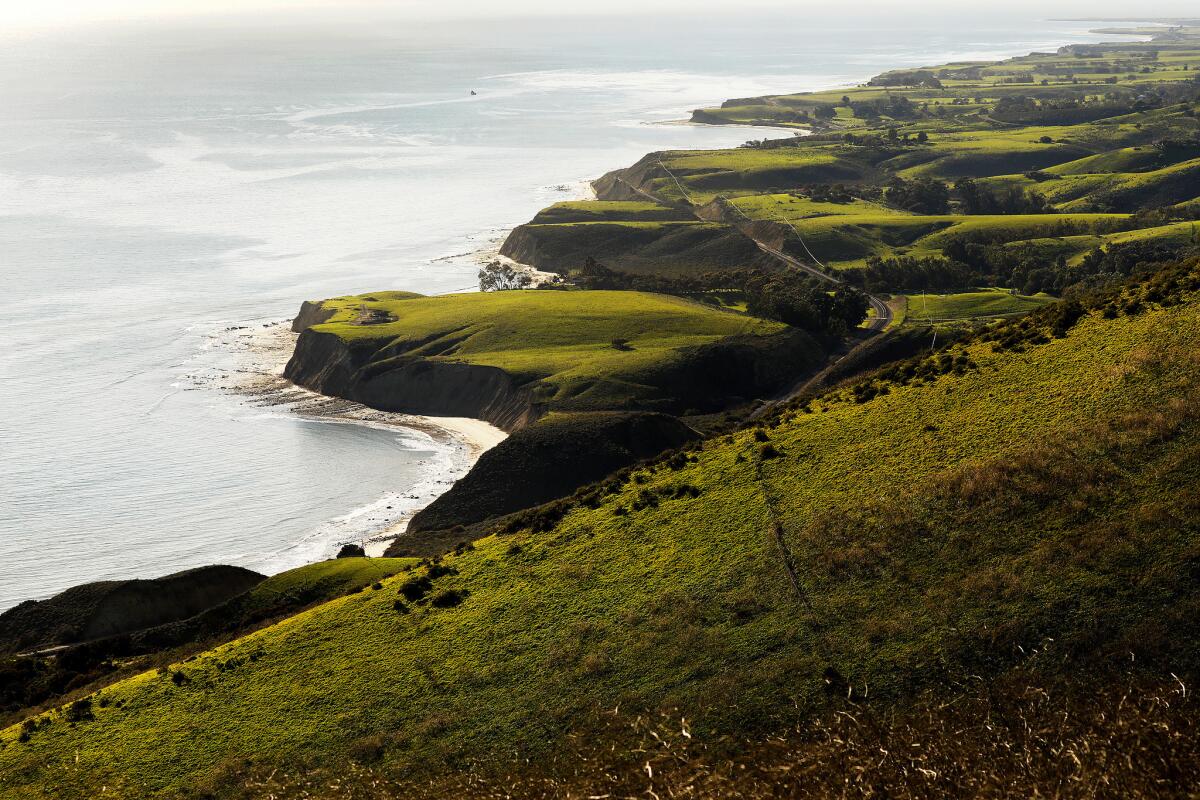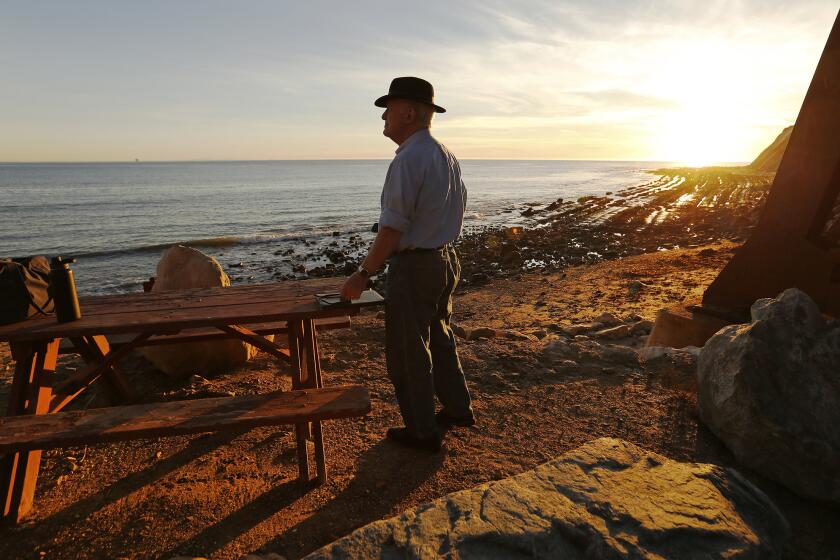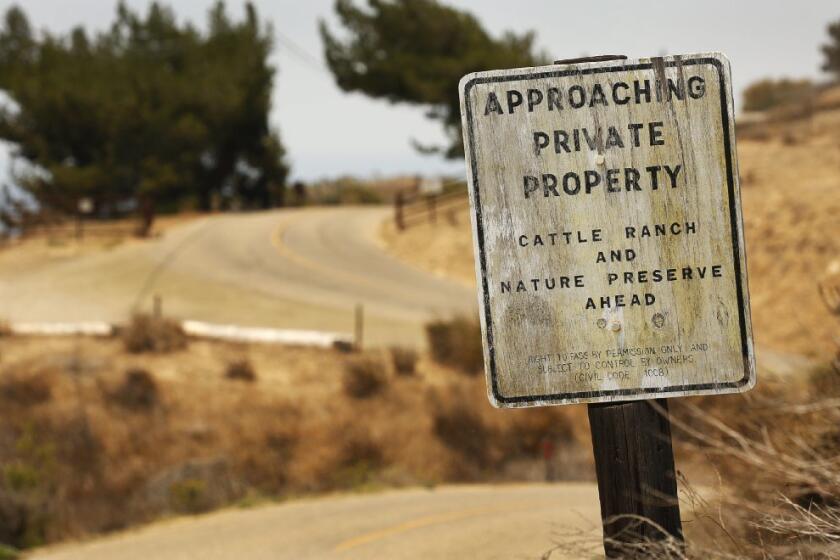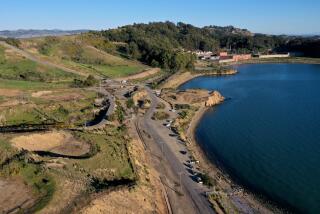Hollister Ranch sues California, calling new public access law unconstitutional

In a new twist to one of the most high-profile — and longest — beach access battles in California, Hollister Ranch sued state officials Thursday over a new law designed to open its exclusive coastline to the public after decades of stops and stalls.
The law, which went into effect this month, declares that the public must be allowed to enter the ranch by land and access some of its 8.5 miles of shoreline by April 2022. Further access would be phased in under a comprehensive plan to be developed in the next two years.
The law also makes it a crime, punishable by tens of thousands of dollars in fines, for any person or group “to impede, delay, or otherwise obstruct the implementation of” public access to these coveted beaches and surf breaks in Santa Barbara County.
Public access advocates have celebrated the new law as a significant move forward on an issue that had faltered in the face of powerful landowners. But ranch officials, who opposed the legislation last year, call many of the provisions an overreach of the state’s authority.
Monte Ward, president of the Hollister Ranch Owners Assn., said the ranch had no objections to the original legislation, Assembly Bill 1680. But as passed, “AB 1680 transformed, without hearings or debate, into an overreaching and unconstitutional bill that tramples on protections of due process, illegal search and seizure, free speech, and the taking of private property without compensation,” Ward said.
Provisions of particular concern include the fines and fees, and allowing state agencies to enter the ranch and to search and use all common areas for the purpose of gathering data.
The law declares that the public must be allowed to enter Hollister Ranch by land and access some of its 8.5 miles of shoreline by April 2022.
The ranch made these concerns clear to the bill’s author, the Legislature and the governor before he signed it into law, Ward said, but “our concerns were ignored.”
Assemblywoman Monique Limón (D-Santa Barbara), who wrote the bill, said she had multiple meetings with the ranch and included them throughout the process. The legislation came together after months of talks with everyone involved, she said, and even had the support of the state’s attorney general.
“Regrettably, this lawsuit is not a surprise. ... This has been Hollister’s go-to for almost four decades — they fight access to a public beach in the courts,” she said. “The need for this legislation speaks for itself.”
The lawsuit was filed in federal court by the Pacific Legal Foundation, a nonprofit known for high-profile cases defending private property rights and what it says are “Americans threatened by government overreach and abuse.”
David Breemer, an attorney at Pacific Legal Foundation who is representing the ranch pro bono, said, “There is a right way and wrong way to deal with access issues.”
“Requiring property owners to submit to searches of property without notice or limits and threatening them with fines for speaking out or acting in other lawful ways to defend their private property is the wrong way,” he said. “If California uses these overreaching means at Hollister Ranch in pursuit of its access goals, no one’s property is safe.”
In recent months, coastal officials and the ranch have been working together to come up with a public access plan that would balance everyone’s concerns. Many owners worry about what unfettered access, unmanaged trash and extra foot traffic could do to their years of work protecting the land.
In an agreement signed last year, the state Coastal Conservancy, the California Coastal Commission, the State Lands Commission and California State Parks pledged to work efficiently to expand and enhance “meaningful, safe, environmentally sustainable and operationally feasible public access to and along the coast at the ranch.”
Efforts so far, the parties say, have been collaborative.
In July, about 20 officials from all four agencies, as well as Santa Barbara County, met with the Hollister Ranch Owners Assn. and toured the shoreline — yet another milestone in a standoff that in past decades had blocked state agencies from even entering the ranch.
Surveyors from the State Lands Commission have also been allowed in to map the public beaches for the first time.
The new law specifies that the ranch must continue to grant access to state officials as they work on the public access plan. Jack Ainsworth, executive director of the coastal commission, has said this legislation provides important guardrails if these good faith efforts take a turn.
Wade Crowfoot, California Secretary for Natural Resources, which oversees the four state agencies named in the lawsuit, reiterated in a statement Thursday that “the governor believes every person has a right to experience the state’s beaches.”
“Access for all to our state’s coastline is a basic fundamental right...” he said. “We will protect Californians’ ability to access all of our 1,000-plus miles of breathtaking coastline, and continue to work with the Hollister Ranch homeowners and stakeholders to develop a public access plan for Hollister Ranch through a collaborative process.”
Ward said the ranch also wants to continue working with the state. He acknowledged that officials have not exercised any of the provisions of concern, but the way the law is written is not acceptable.
“This is not an action we wanted to take,” he said. “Indeed, we have been encouraged by the unprecedented effort ... state leaders have made to take a fresh look at the facts on the ground and, through collaboration and cooperation, develop a new access plan that preserves a wilderness coastline rich in biodiversity and cultural resources, while protecting the ranch’s privacy and traditions.”
Lawsuits have become par for the course in this public access issue that has dragged on since the state’s landmark Coastal Act was passed in 1976. Increased public scrutiny last year exposed a history of litigation and exceptionalism that kept the public gated off for decades.
Public pressure to open the beaches mounted in 2018 after ranch and coastal officials agreed to a controversial deal that would have allowed access only to ranch owners, their guests, visitors with guides and those who could boat or paddle in from two miles away.
The Times published the terms of this deal, which was struck behind closed doors. A coalition of nonprofits has been fighting its own battle against Hollister and this controversial settlement in court.
Coastal officials heeded the public outcry and have since looked for new ways to obtain access once and for all.
More to Read
Sign up for Essential California
The most important California stories and recommendations in your inbox every morning.
You may occasionally receive promotional content from the Los Angeles Times.













